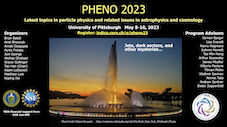Speaker
Description
Stellar binaries have historically provided a rich target in the search for exotic compact objects such as primordial black holes (PBHs) or MACHOs. A sufficiently heavy compact object flying sufficiently close to a binary will disrupt or soften it, an effect that will show up in binary data as sparseness at large separation bins. While most studies have focused on the softening of wide binaries, we point out that compact objects that are lighter than the binary components would instead cause the binary to become tighter, following Heggie’s Law. The hardening of binaries perturbed by light PBHs opens up the possibility to probe sub-solar mass PBHs. The hardening effect would manifest itself as an excess of binaries at separations ∼ 10^4 − 10^6 AU, and such separations therefore constitute an important target for Gaia. A future challenge is to distinguish such an excess over uncertainties emanating from the initial distribution of binaries. A way forward could be to compare data between two classes of binaries that have similar initial distributions but different interaction rates with PBHs.
